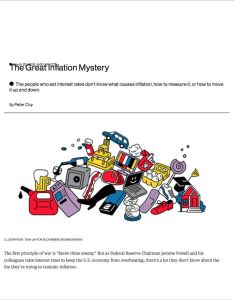Join getAbstract to access the summary!

Join getAbstract to access the summary!
Peter Coy
The Great Inflation Mystery
The people who set interest rates don’t know what causes inflation, how to measure it, or how to move it up and down.
Bloomberg, 2018
What's inside?
The data the Federal Reserve uses to predict and manage inflation are seriously flawed.
Recommendation
The Federal Reserve claims that its decisions to raise or lower interest rates are well reasoned and in line with the inflationary environment. Yet the Fed’s inflation crystal ball is highly clouded, creating a backdrop for monetary policy that may do more harm than good. Bloomberg writer Peter Coy finds that, while inflation is notoriously difficult to measure or forecast, some economists are examining promising new ways to do just that. getAbstract recommends this intriguing article to financial forecasters, economists and others interested in the pitfalls of price predictions.
Summary
About the Author
Peter Coy is the economics editor of Bloomberg Businessweek.


















Comment on this summary
It’s a classic among libertarians and proponents of the Austrian school.